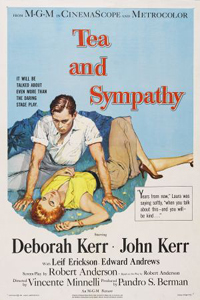Tom is a college boy who is not very virile, and because of the ridicule and suspicion he elicits, the college headmaster’s wife, Laura, is kind and helpful to him. Laura herself could use some kindness, though, since she is married to a man who, though manly, resists her and is a repressed homosexual. He is seemingly jealous of Tom—a heterosexual, by the way—who knows how to receive and appreciate Laura’s sympathetic care.
The agony associated with what the human heart demands and needs is what Tea and Sympathy (1956)—film by Vincent Minnelli, play and screenplay by Robert Anderson—is about. Properly and knowingly, Minnelli put the play on the screen, and the top-notch cast from the Broadway production (Deborah Kerr, et al.) was used. The result is a truly adult film, i.e. one for an adult sensibility, presented with appreciable power. Kenneth Tynan rightly thought the play a good middlebrow work; no less so is the movie.



